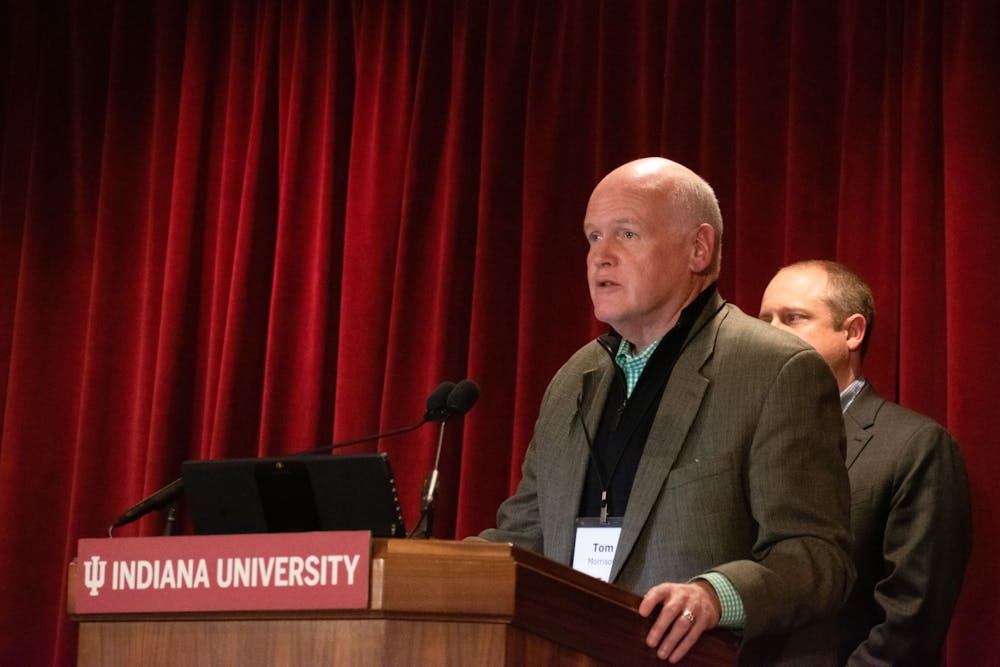The IU Climate Action Planning Committee hosted an open forum at the IU Auditorium on Wednesday for students, faculty and staff to learn about the committee’s work and share their ideas about what the committee should be focused on.
The event, co-hosted by the committee and its partner SmithGroup, a Detroit-based architecture firm, was primarily about the university’s 2023 Climate Action Plan, which notably includes a commitment to carbon neutrality by 2040.
“There is time value in starting, just writing a check today where you invest in growing trees on a site,” Stet Sanborn, principal-in-charge for the project at SmithGroup, said.
However, the event was also marked by quiet protest among several attendees, who brought cardboard signs with messages like “Practice what you teach, climate action NOW” and “Climate Action Plan by 2023.”
Much of the beginning of the event was structured around anonymous polling sessions, where attendees could answer questions posed by the committee. Many of those same attendees took a skeptical stance on IU’s current work in regard reducing carbon emissions, using these sessions to tell the committee the university still wasn’t doing enough.
In response to the question, “What is IU Bloomington doing to reduce carbon emissions today?,” the top answer was, “Saying that they’re making a plan.” Others simply said, “Not enough.” Still others answered questions such as “What may be some challenges that Indiana University may face when reducing carbon emissions?” with specific concerns: “The IU Foundation continuing to invest in fossil fuels.”
Student groups have long called for the IU Foundation to stop investing in fossil fuels, with the All University Student Association having passed a resolution calling for this in 2014, according to the Board of Trustees website. Sunrise Bloomington, a climate activism group, called for the same as recently as this year, according to WFYI. Nevertheless, Thomas Morrison, a committee chair, said the university has no authority to direct the Foundation’s investments.
“The university cannot legally direct the foundation,” he said. “However, in the interest of transparency, we did meet with the leadership of the IU Foundation during the summer and talked about the issue of investments, and they are looking at their investments relative to renewable energy.”
The open mic portion of the event provided an opportunity for attendees to ask questions more directly to the committee and displayed clearly the restlessness and pessimism among students and staff in regard to the university’s climate policy. A major concern was a perceived lack of transparency on behalf of the committee, including the fact its meetings are private.
“What we’re trying to do with any committee is to allow people to have free exchange, and so that’s one of the reasons,” Morrison said. “We want the committee members to have open and honest dialogue, and if that is a public setting, maybe you don’t have that.”
Others took specific issue with the fact that, even for the public forums the committee has held, students and staff who aren’t able to attend in person are left with no other options to view those meetings. No live broadcast or a post-meeting transcript is made available.
“You mentioned earlier that you make it available for the public to see the community feedback,” one student said, referencing the event’s anonymous polling sessions. “Do you not believe that, for accessibility and accountability and clarity, that your responses to the community feedback should also be available online?”
Morrison reiterated that the committee had no plans to record or transcribe any future public forums, nor make the committee’s meetings open to the public.
“It’s all public in this realm,” he said, regarding the open forum. “So, I’m providing answers.”
Another concern among attendees was the plan’s specific focus on scope one and two emissions, which many saw as ignoring scope three emissions. According to Sustain Life, scope one emissions are emissions that are burned in “owned or controlled assets” such as vehicles or boilers; Scope two emissions are those from purchased electricity, heating or cooling in buildings.
The committee defined scope three emissions as “all other indirect emissions a result of activities from assets not owned or controlled” by the university. Morrison said the committee’s goal currently is to focus on scope one and two emissions, and that its data on scope three emissions is not nearly as robust.
“The committee wanted to tackle scopes one and two right away, and we do anticipate that scope three will be part of the future plans,” he said.
According to News at IU, the Climate Action Planning Committee was established by IU President Pamela Whitten in April 2022, and the recommendations by the committee to reduce greenhouse gasses and carbon emissions are due by April 2023. Some students at the open forum expressed concerns with Whitten’s role in this process, which includes selecting those who serve on the committee.
“So many big answers we’re seeking can only be given to us by President Whitten,” one student said. “I would hope and expect Whitten can attend the next one of these panels to hear feedback and answer those questions.”
Morrison said the next public forum is scheduled for the spring semester, however there is currently no tentative date.





